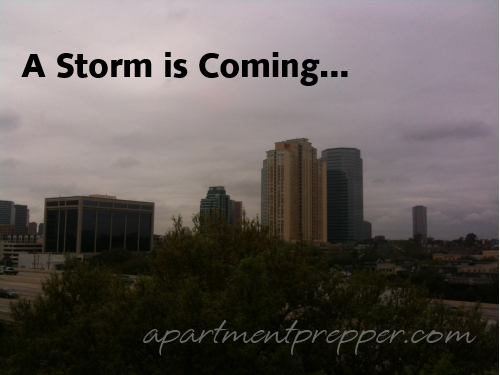This post is by Bernie Carr, apartmentprepper.com
In the aftermath of the recent historic flooding in Houston, we saw a few neighbors hauling out all their furniture, carpets and other belongings that were drenched by floodwaters. Some families are even worse off as entire homes were engulfed and carried off in the floods.
Preppers try to be ready for emergencies whether foreseeable or not, but there are always inherent risks to everything. If you store your preps in your home, it is possible to lose them should a tornado strike, or should floodwater or fire engulf your home. I’m not trying to say it’s pointless to prep, this is all the more reason to carefully consider what steps to take in order to minimize the risk.
What are some things you can do now to help you mitigate the risks?
I don’t have all the answers but I thought I’d just post some thoughts to get us started in figuring out the best way to prepare for a major disaster.
- List all disasters that are possible in your area. It is pointless to worry about earthquakes if you never have earthquakes in your area, or radiation leaks if you don’t have a nuclear power plant nearby. I have never experienced a tornado in Houston, but some residents have experienced small ones that have touched down in outlying areas. Therefore, we have to consider the possibility.
- Stay aware of what’s going on so you can plan accordingly. Trust your gut: if you have a bad feeling that something is about to happen, heed those warnings. The worse that can happen is you’ll feel foolish about overreacting later, but if something does happen, you will be glad you trusted your gut.
- Get adequate insurance coverage for your home or apartment. Read the policy thoroughly so you understand what is covered. Flood insurance is not covered by most standard policies and a separate policy would have to be obtained. Keep a copy of your insurance policies in a safe place, and a backup copy elsewhere.
- Take photos or video of your belongings for your records and note the date taken in case you have to file a claim. Store it in a safe place and have a backup location.
- Spend a day making backups of all your important documents, and store the record in a couple of places just in case.
- Have a hard copy of all your emergency contacts instead of storing everything in your cell phone. If you were to lose your cell phone in a disaster, you will be hard pressed to search for your contacts at a time when your mind is reeling.
- Learning survival and self sufficiency skills is a great hedge against losing everything. Even if you lose your physical preps, the knowledge you have gained will help you start over.
- Heed evacuation warnings and head to a safe area as soon as possible. Although sheltering in place is preferable for most preppers, sometimes you have no choice but to bug out. Your life is more important. Keep your bug out bag easily accessible in the event of a dire emergency.
- Make an emergency plan so every family member knows what to do.
- Conduct drills to practice your emergency plan
- Have some savings set aside, in various areas that are accessible to you. I always get flack for suggesting you keep some savings in a bank, but if you keep everything at home and you lose that home, at least the bank will still be standing. If you don’t like large banks, then a local credit union is a good option.
- As a final thought, sometimes, you just need to pray for strength and have faith in God that you will have the courage to endure.
A Little Help from Friends
You don’t have to do this alone – there are a lot of sites that can help you along. Best of all, learning all this information won’t cost you anything. Here are a few sites to get you started:
Just as there is no way to be insured for everything, there is no way to prepare for every disaster under the sun. But you can try your best to take these steps, set your mind at ease, knowing that you are doing everything you can to protect yourself and your family.
© Apartment Prepper 2015


Great tips! Love the website suggestions. I visit many of the frequently always looking to fill in the blanks of preparedness.
Thanks Mike!!